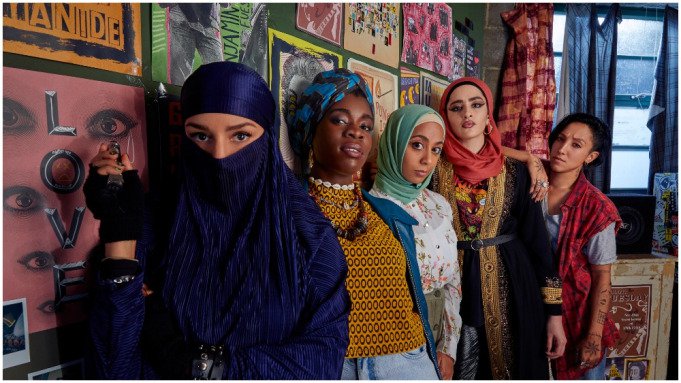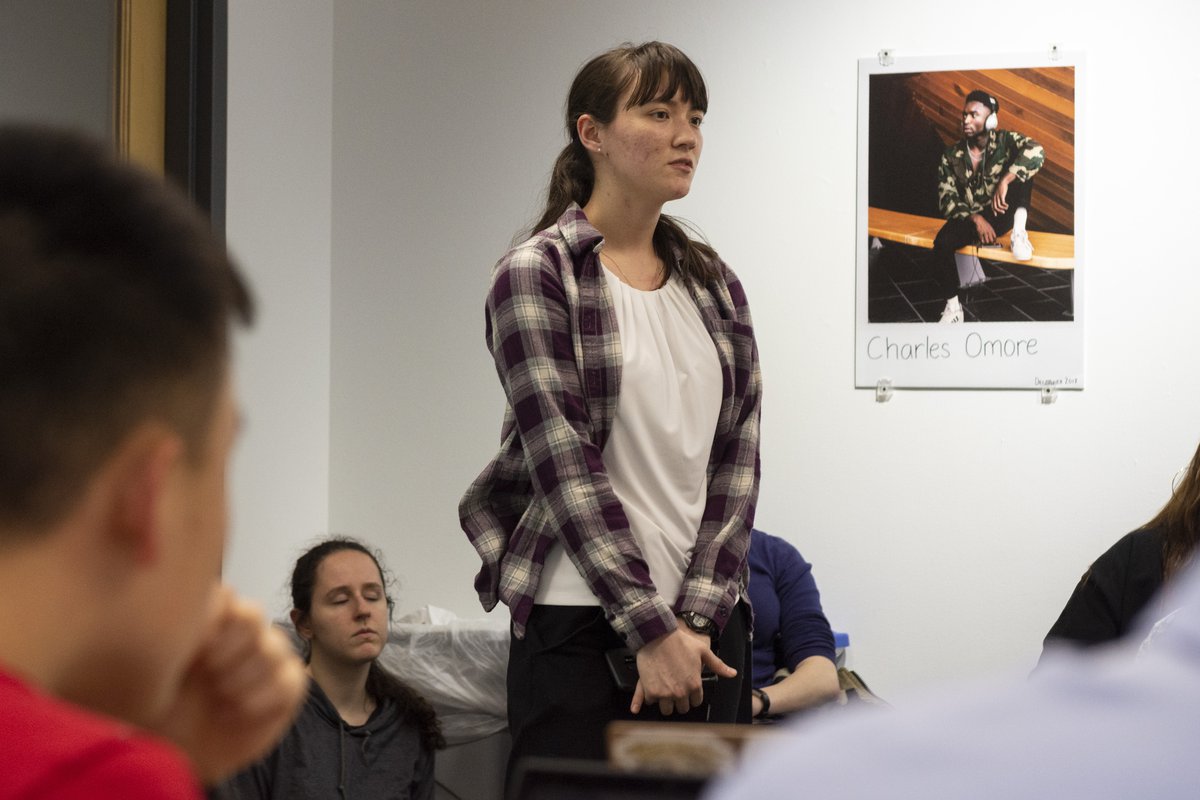We Are Lady Parts is the quirky coming-of-age narrative we’ve been waiting for

We Are Lady Parts, a comedy series created by Nida Manzoor, follows a fictional all-female British-Muslim punk band called Lady Parts as they prepare and audition for the battle of the bands competition, Sound Smash. We had high expectations going into the show: the trailer looked like a lot of fun, and the original pilot on the Channel 4 Comedy YouTube channel was fantastic. We Are Lady Parts excels in creating a sincere storyline peppered with witty dialogue, fantastic music, and deeply relatable characters that offer a diverse group of Muslim women the nuanced storylines they deserve.
Inspired by the Bechdel Test and Riz Ahmed’s 2017 speech in the House of Commons, the Riz Test contains criteria for evaluating Muslim portrayals in televison and film, such as if the character is a terrorist or only shown as oppressed by her male counterparts. We Are Lady Parts, with its multifaceted portrayal of British-Muslim life, passes the test with flying colors. The main character, a microbiology PhD student named Amina Hussain (Anjana Vasan), has a “nervy disposition,” suffers from intense performance anxiety, and stumbles onto Lady Parts. The show’s first season follows Amina’s journey overcoming this affliction and her friendship with the other members of Lady Parts: brooding lead singer Saira (Sarah Kameela Impey), gruff drummer Ayesha (Juliette Motamed), zen bassist Bisma (Faith Omole), and their enigma of a manager Momtaz (Lucie Shorthouse).
“Our music is about representation. It’s about being heard,” says Saira. That is the thesis of We Are Lady Parts, and represent, it does. The women in the band are portrayed as badasses and given their own complex storylines. We Are Lady Parts does not care about repeating the tired tropes of Muslim women being held back by their religion—they need to get to the music and jokes, already!
The show also hilariously upends the stereotype of the conservative immigrant parents and the rebellious “Westernized” daughter. In fact, it’s Amina who’s extremely strict—largely due to the influence of her toxic friends outside the band—and worried about finding a husband. Her parents, on the other hand, aren’t concerned with the matter and just want her to be happy. This multidimensional representation is refreshing, especially compared to some other shows with prominent South Asian characters, like The Mindy Project. We also appreciated how multiple ethnicities of Muslim women were represented within the band and the show, reflecting real-life intersectionality.
Lady Parts’ discography is comprised of original music, written by the show creator Nida Manzoor, her siblings, and brother-in-law. Also, each of the actors in the band are actually playing their instruments—some already had a musical background, while others learned how to play for the show.
In We Are Lady Parts, punk music, often seen as off-putting by the masses, is a source of joy and self-expression. Punk music is about being outside of the mainstream, not conforming to the dominant culture—and the women on this show are anything but conforming. The lyrics of Lady Parts’ music tell the stories of the band members—from snapping back at the people who ogle at their headscarves with the song “Voldemort Under My Headscarf” to their dating troubles in “Bashir With the Good Beard.”
“Bashir With the Good Beard,” a play on Beyoncé’s “Becky with the good hair” is the first time the audience really sees Amina express herself in front of others, overcoming her performance fright. Not to mention, the song is incredibly catchy. The line “You say I’m not polite / I say ‘fuck you very much!’” is unforgettable.
A personal favorite of ours, “Fish and Chips,” is an anthem for the second-generation immigrant experience. In the chorus, the band sings “Broken by the Empire / Raised by MTV / Misfits of the motherland / Still fish and chips for tea.” Those of us who are part of a diaspora often feel like we belong neither in the country we live in nor the countries of our parents. Instead, we belong to a third culture that combines elements of both, and the lyrics ring true to this sense of fractured identity.
The band practice scenes are some of the highlights of the show, serving as a window into the riot grrrl glory of Lady Parts as a band and Amina’s character progression. At first, Amina awkwardly suggests that the women should go for “yay!” instead of “grr” in their music, and tries to make some cheery G-rated edits to their song lyrics to the band’s disgruntlement. As Amina begins to become more comfortable and less harsh on herself, we see her and the other Lady Parts members riffing off each other to create new music.
Each member of Lady Parts has exaggerated defining traits which drive the comedy, but instead of falling into harmful stereotypes or trite clichés, the show deftly uses these to craft strong personalities. The enigmatic Momtaz is a marketing genius who refines her skills in her day job as a clerk at a lingerie store. In one scene, we see her close a sale from a shy customer by slyly asking if they’re interested in a “shag me kindly” or “shag me hard” bra. Saira’s intense angstiness is only matched by her extreme aversion to romance. Ever the dramatic, she literally writes a manifesto for the band’s ideals, casually drops lines like “Verily, it is I,” and rants about the patriarchal origins of marriage. Ayesha, introduced as the most closed-off band member, comically melts away her hard exterior the second she meets a pretty girl. Despite Bisma’s “zen and chill” personality and being a married mother, her comic book is the exact opposite, telling the story of a dystopian world where women become homicidal murderers during their period. Historically, these quirky narratives in Western media have mostly been afforded to white women. Seeing Black and brown Muslim women finally get these storylines is incredibly rewarding, and the show’s fantastic execution is endlessly entertaining.
Overall, the show was an absolute delight. Even with the limited number of episodes, the characters are complex and easy to root for. It’s still up in the air whether or not the show will return for a second season, but we hope it does. We Are Lady Parts is currently only available to stream in the U.S. via Peacock Premium—it’s definitely worth signing up for the free trial. Each episode is around 20 minutes long, and the season is only six episodes, making it highly bingeable. If there is one show you should watch this semester, it’s We Are Lady Parts.

 Academics
Academics
 Administration
Administration
 Tv Series Review
Tv Series Review